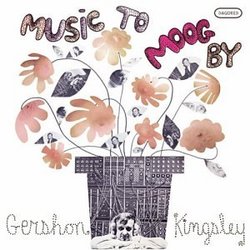Good Moog, But Not Top Moog
K. Brown | Walnut, Ca USA | 01/17/2004
(3 out of 5 stars)
"I did enjoy this CD, especially the opening tune "Hey, Hey," which is one of Gershon Kingsley's own compositions. While I liked the take he did on songs by Paul Simon, Lennon & McCartney, and his unique spin on Beethoven, I enjoyed the tunes that bore his name on the writing credits. Kingsley is, after all, the guy who wrote the music for Moog's most recognizable hit "Popcorn." The version on this CD is the original, not the one that made a hit on the radio in the early 1970s (the hit version was done by Stan Free's nom de plume "Hot Butter"). If you want to hear where the roots of the hit originated, this CD is a "must buy."This is good Moog muzik, but if you want prime and funky Kingsley, I highly recommend the sounds he made with Jean-Jacque Perrey, namely "The In Sound From Way Out!" That work, created in 1966, is the fabulous personification of mid 20th Century Space-Age Muzak, so hep, hardly anybody realizes it!"
One of the great Moog albums, with the original "Popcorn"
BENJAMIN MILER | Veneta, Oregon | 02/19/2004
(5 out of 5 stars)
"Gershon Kingsley was another one of the early electronic pioneers, he even released his share of albums with Jean Jacques Perrey even before W. Carlos gave us Switched-On Bach. Kingsley was born in Germany in 1923, but since he was Jewish he fled to Palestine in 1938 while still a teenager, because of the rise of the Third Reich and the persecution of Jews. In 1946 he came to America, and by 1955 he was living in New York. He involved himself in songwriting arrangements for television, Broadway, religious songs, etc. He even worked for Vanguard Records. In the 1960s, he decided to go hi-tech, team up with French-born Jean Jacques Perrey, and released a series of albums. One song I recognize from this era was "Electronic Can-Can" (from 1966's The In Sounds From Way Out), which was featured on the children's TV show Wonderama (from New York, a show I was unaware of since I never lived in New York, but I was fully aware of its spinoff, Kids Are People Too, as that was aired nationally), and if you lived in the Portland, Oregon area in the 1980s (or lived in an area you could get KPTV on cable, which I did, living in Eugene), you'd hear that song on the Ramblin' Rod Show during the "Smile Contest". Music to Moog By was Kingsley's first album without Perrey, released in 1969 on the Audio-Fidelity was his first solo album. This was one of many post-Switched-On Bach moog albums, and one of the better ones. You get to see several pictures of Kingsley's modular Moog (looks like a III-C, like what Keith Emerson used) in the cover artwork as well as the back of the album. Here Kingsley does his share of pop hits and classical on the Moog as well as a few new compositions. One of the new compositions most noteworthy is "Popcorn", which later became a hit in 1972 with Hot Butter (which I understood consisted of musicians from Kingsley's First Moog Quartet, the project he would do after Music to Moog By). You can still recognize the song, but it does sound different from the better known hit version from 1972. Kingley was said to see a popcorn machine and watching it pop, and he thought the rhythm of popcorn popping could make a song, and that's what he attempted to do. "Hey-Hey" is another original, where you keep hearing "Hey Hey" being shouted, where you can't tell if it was the Moog doing it or a real person. There's a nice version of the traditional English folk song "Scarborough Fair" (which wrongly credits Paul Simon for it, although it's well known that Simon & Garfunkel were the ones who made it famous). I liked this flute sound (apparently produced by the Moog itself) that you hear in this song. Two Beatles songs are covered here, "Nowhere Man" and "Paperback Writer". The album had the latter misprinted as "Paperback Rider", meaning he likely heard the song wrong. I also suspect he probably wasn't that big on the Beatles since he was a generation older than the average Beatles fan, and more into classical, Jewish religious songs and klezmer, and traditional songs. It's nice hearing these two songs in a Moog format, I am not aware of anyone else who took Beatles songs to the Moog, but then there were so many Moog albums released between circa 1967 to circa 1972 that there probably were others covering the Beatles. He also does a Beethoven song called "Für Elise", which he titled "For Alise" (English translation, but of course, Kingsley would be fully aware of the original German title, given that's the country he came from and fled). You also get "Twinkle Twinkle". Yes, the children's song based on a French melody "Ah Vous Dirai je Maman", in which Mozart did some variations thereof. Usually I prefer the more trippy Moog albums as done by the likes of Nik Raicevic (aka Nik Pascal or Pascal) or Mort Garson, but this is a better example of pop and classical Moog I've heard. This is truly a wonderful album for those who enjoy early Moog recordings."


 Track Listings (10) - Disc #1
Track Listings (10) - Disc #1